SLAS Announces $100,000 Graduate Education Fellowship Grant Awarded to Benjamin David of the University of Michigan, Ann Arbor
For Immediate Release
Oak Brook, IL (May 5, 2022) – The Society for Laboratory Automation and Screening (SLAS) is pleased to announce Benjamin David, a Ph.D. candidate from the University of Michigan, Ann Arbor (Ann Arbor, MI, USA), as the 2022 SLAS Graduate Education Fellowship Grant recipient.
"I am excited about this opportunity," David comments. "The SLAS grant offers the freedom to explore interesting developments as they emerge from research. As I progress through this project, if I find an interesting aspect of the research, I have the freedom to pause and explore that new area. That wouldn't be possible with other types of grants tied to specific work."
The SLAS Grant will cover David's exploration of sequential transcriptional profiling, a tool that holds potential to unlock new areas in life sciences research while improving efficiency, practicality and reducing costs through the use of artificial intelligence (AI) to guide research selections. Transcriptional profiling, or measuring the relative change of RNA transcripts, is a powerful, genome-wide tool for measuring gene expression in response to varying experimental stimuli. While next-generation sequencers have rapidly decreased the cost of RNA sequencing, most of these small-scale experiments study a single stimulus in isolation and do not scale to larger studies.
“I am interested in studying many different stimuli at once because it is more reflective of the complexity of biological systems,” explains David, who began this work at the University of Illinois, Urbana-Champaign (UIUC, Urbana, IL, USA). “What I propose is a process of many sequential experiments guided by an AI technique known as reinforcement learning (RL) to help decide where we go next after the first and every subsequent experiment. Our goal is to find compelling genotypes that lead to phenotypes that we're interested in studying further.”
David plans to leverage the immense knowledge base available in SLAS membership to support his grant research. "I anticipate a few logistical challenges in this research that have a lot to do with automation," he comments. “It's not feasible for me to set up large-scale experiments solo without fear of making mistakes from the sheer volume of things to accomplish. As I'm able to get more involved with SLAS, I know I will encounter a lot of great ideas for how to approach quality control, logistical issues, working with the liquid handling robots in our lab and much more.”
Judging criteria for the SLAS Graduate Education Fellowship Grant is based on the applicability of the student researcher’s work to laboratory automation and screening, originality and creativity of the scientific approach, quality of the science, presentation of the research objectives, and the quality and capability of the institution and its educational program to support the grant.
The SLAS Grant Program was introduced in 2015 to facilitate educational opportunities for outstanding students pursuing graduate degrees related to quantitative biosciences and/or life sciences R&D. This program helps to realize a fundamental tenet of SLAS’s mission: to advance the fields of laboratory science and technology by nurturing the next generation of professional scientists.
SLAS (the Society for Laboratory Automation and Screening) is an international community of more than 19,000 individual scientists, engineers, researchers, technologists and related professionals from academic, government and commercial research laboratories. The SLAS mission is to be the preeminent global organization providing forums for education and information exchange and to encourage the study of, and improve the practice of, life sciences discovery and technology. For more information, visit www.SLAS.org. For more information visit www.SLAS.org or contact SLAS Global Headquarters at +1.877.990.SLAS (5727) or e-mail [email protected] .

Contact Information
Jill Hronek
Director of Marketing Communications
Telephone: +1.630.256.7527, ext. 103
E-Mail: [email protected]
- SLAS Governance
- Meet the People of SLAS

- News Releases
SLAS announces $100K graduate education fellowship grant awarded to David McIntyre of Boston University
SLAS (Society for Laboratory Automation and Screening)
"The SLAS fellowship will give me additional freedom and support in my research to explore new ideas as I progress into the latter stages of my Ph.D.," says McIntyre. "Being involved in SLAS will give me a forum to present my ideas and receive feedback from members outside of my field."
McIntyre has hope for the future of his research, and the world. "Beyond having the world return to a 'new normal,' I hope to see further adoption of automation high-throughput technologies in the life sciences as it transitions into a more data-driven, engineerable field," says McIntyre. "Personally, I look forward to advancing my research to provide some value to the field and finding what role I can play in the biotechnology and automation community."
Judging criteria for the SLAS Graduate Education Fellowship Grant is based on the applicability of the applicant's research to laboratory automation and screening, originality and creativity of the scientific approach, quality of the science, presentation of the research objectives, and the quality and capability of the institution and its educational program to support the grant.
The SLAS Grant Program was introduced in 2015 to facilitate educational opportunities for outstanding students pursuing graduate degrees related to quantitative biosciences and/or life sciences R&D. This program helps to realize a fundamental tenet of SLAS's mission: to advance the fields of laboratory science and technology by nurturing the next generation of professional scientists.
SLAS (Society for Laboratory Automation and Screening) is an international professional society of academic, industry and government life sciences researchers and the developers and providers of laboratory automation technology. The SLAS mission is to bring together researchers in academia, industry and government to advance life sciences discovery and technology via education, knowledge exchange and global community building. For more information about SLAS, visit http://www.slas.org .
SLAS publishes two peer-reviewed and MEDLINE-indexed scientific journals, SLAS Discovery and SLAS Technology . For more information about SLAS and its journals, visit http://www.slas.org/journals .
Disclaimer: AAAS and EurekAlert! are not responsible for the accuracy of news releases posted to EurekAlert! by contributing institutions or for the use of any information through the EurekAlert system.

Ulri Nicole Lee of the University of Washington Awarded $100,000 SLAS Graduate Education Fellowship Grant
The Society for Laboratory Automation and Screening (SLAS) Announces $100,000 Graduate Education Fellowship Grant Awarded to Ulri Nicole Lee of the University of Washington
Newswise — Oak Brook, IL (USA) – Ulri Nicole Lee, Ph.D. candidate, (University of Washington) is the 2020 recipient of the SLAS Graduate Education Fellowship Grant. This is the fifth year the SLAS grant has been awarded to an outstanding student researcher.
Lee will receive $100,000 awarded over two years to expand her research on the development of a device that uses mist to capture bioaerosols such as Aspergillus fumigatus , a prolific fungus that is harmful to those with preexisting lung conditions, and fluidics to collect the sample for analysis. This device could be used in homes, work, and community environments to collect and store samples for downstream analysis and ultimately lead researchers to a better understanding of environmental exposures on human health.
“Researchers and clinicians are currently ill-equipped to pinpoint the patient-specific triggers for asthma, limiting our understanding of the effects the environment can have on our health,” says Lee. “My research aims to fill this need by providing a portable air-sampling device that identifies bioaerosols on a species-level, such as fungal spores and bacteria (known irritants for asthma patients) and then adapt the design to particulate matter and volatile organic compounds (VOCs).”
Judging criteria for the SLAS Graduate Education Fellowship Grant is based on the quality and capability of the student’s institution and its educational program to support the grant, endorsement and commitment by the institution and faculty advisor with the student applicant, the quality and record of the specific research program and the quality and promise of the research being proposed, among other factors.
The SLAS Grant Program was introduced in 2015 to facilitate educational opportunities for outstanding students pursuing graduate degrees related to quantitative biosciences and/or life sciences R&D. This program helps to realize a fundamental tenet of SLAS’s mission: to advance the fields of laboratory science and technology by nurturing the next generation of professional scientists. The application period for the 2021 SLAS Graduate Education Fellowship Grant runs from August through December 2020.
SLAS (Society for Laboratory Automation and Screening) is an international community of 16,000 professionals and students dedicated to life sciences discovery and technology. The SLAS mission is to bring together researchers in academia, industry and government to advance life sciences discovery and technology via education, knowledge exchange and global community building.
SLAS publishes two peer-reviewed and MEDLINE-indexed scientific journals, SLAS Discovery and SLAS Technology . For more information about SLAS and its journals, visit www.slas.org/journals .
MEDIA CONTACT
Type of article.
- Experts keyboard_arrow_right Expert Pitch Expert Query Expert Directory
- Journalists
- About keyboard_arrow_right Member Services Accessibility Statement Newswise Live Invoice Lookup Services for Journalists Archived Wires Participating Institutions Media Subscribers Sample Effectiveness Reports Terms of Service Privacy Policy Our Staff Contact Newswise
- Blog FAQ Help
Samuel Berryman, Ph.D. Candidate | 2023 SLAS Graduate Education Fellowship Grant Recipient New Matter: Inside the Minds of SLAS Scientists
- Life Sciences
We welcome the 2023 SLAS Graduate Education Fellowship Grant recipient Samuel G. Berryman, Ph.D. candidate in the Department of Mechanical Engineering from the University of British Columbia (Vancouver, BC, Canada), as our guest. The SLAS grant will support Berryman’s research in developing and designing technologies for studying Chimeric antigen receptor (CAR)-T cells, a cell type used for a novel form of cancer therapy. Listen as Berryman shares his research goals and how he thought outside the box to fill the room for his SLAS2023 student presentation. The SLAS Graduate Education Fellowship Grant directly supports outstanding students pursuing graduate degrees related to life sciences R&D. This program helps realize a fundamental tenet of SLAS’s mission: to advance the fields of laboratory science and technology by nurturing the next generation of professional scientists. For more information on SLAS awards and grants, visit https://www.slas.org/careers/awards-and-grants/slas-graduate-education-fellowship-grant/. Stay connected with SLAS Online at www.slas.orgFacebookTwitter @SLAS_OrgLinkedInInstagram @slas_orgYouTubeAbout SLAS SLAS (Society for Laboratory Automation and Screening) is an international professional society of academic, industry and government life sciences researchers and the developers and providers of laboratory automation technology. The SLAS mission is to bring together researchers in academia, industry and government to advance life sciences discovery and technology via education, knowledge exchange and global community building. For more information about SLAS, visit www.slas.org. Upcoming SLAS Events: SLAS Europe 2024 Conference and Exhibition May 27-29, 2024 Barcelona, Spain SLAS 2024 Microscale Innovation in Life Sciences Symposium 11-12 September 2024 Cambridge, United Kingdom SLAS 2024 Sample Management Symposium 16-17 October 2024 Toulouse, France SLAS 2024 Data Sciences and AI Symposium November 12-13, 2024 Cambridge, MA, USA View the full events calendar
- More Episodes
- © 2024 New Matter: Inside the Minds of SLAS Scientists
Medical Design and Outsourcing
SLAS accepting applications to New Graduate Education Fellowship Grant
October 21, 2015 By Nic Abraham

Applications are due by October 23 to be considered for 2016 grant award.
The Society for Laboratory Automation and Screening (SLAS) is currently accepting applications to be considered for the Society’s new Graduate Education Fellowship Grant Program, which supports graduate students looking to pursue a career in the life sciences. Applications from qualifying educational institutions, on behalf of specific graduate students, received by the October 23, 2015 deadline will vie to be awarded up to $50,000 per year (for a maximum of two years). The first recipient of this grant program will be announced in April 2016. Program details and a link to the application can be found on the SLAS Graduate Education Fellowship Grant web page.
Applications must be made by qualifying educational institutions that offer graduate programs related to quantitative biosciences or life sciences research and development. Student candidates are not eligible to apply for these Grants directly. Rather, the application must come from the candidate Student’s academic institution. Students can facilitate the effort by coordinating the application process with their Primary Research Investigator and/or academic mentor from their educational institution. Details for both institutions and prospective applicant students can be found on the SLAS Web site.
Originally announced by SLAS President Dean Ho at SLAS2015 in February in Washington, DC, the new grant program was established with $1 million in seed funding by SLAS. “Education has always been a cornerstone of SLAS’s purpose, and one of the most powerful things that we do,” says Ho. “Implementing this fund takes our support of scientific education, innovation and careers to the next level. As a global Society, we are committed to fostering continued scientific innovation and cultivating the next generation of professionals who will drive that innovation, which will ultimately result in better, more accurate research.” The SLAS Graduate Education Fellowship Grant Program is administered under the SLAS Education Fellowship Grant Review Panel and the SLAS Awards and Grants Advisory Committee. Applications will be evaluated from three different perspectives: quality of the applicant student, quality of the student’s mentor, and quality of the applicant educational institution. Judging criteria will consider alignment with the SLAS mission, the caliber and track record of the institution, qualifications and achievements of the student, creativity of the proposed research, and other variables. Additional details can be found on the Grant Program web page.
“SLAS has always done a great job of bringing graduate students and young people into the organization to assist in their development into outstanding scientists and technologists,” said Susan M. Lunte, Ph.D., University of Kansas, and chair of the SLAS Education Fellowship Grant Review Panel. “With this fellowship, we’re looking to provide an opportunity for the best of the best – those scientists doing exciting, state-of-the-art work who will be leaders in the field as they move forward in their careers.”
The $1 million with which SLAS is seeding this new program is in addition to the more than $150,000 the Society allocates annually to underwrite student programs and participation at the annual SLAS International Conference and Exhibition by way of the Tony B. Academic Scholarship Program, student-focused programming, discounted memberships and journal access, career services and related skills development. In order to sustain and expand the SLAS Educational Fund, the Society intends to conduct future fundraising initiatives among SLAS members and the industries SLAS serves.
For more information about the SLAS Graduate Education Fellowship Program SLAS, including deadlines, applicant tips, and a link to the application, visit the Grant Program web page.
Society for Laboratory Automation and Screening (SLAS) www.SLAS.org
Related Articles Read More >
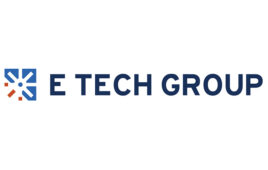
E Tech Group names VP of Life Sciences Central and Process Industries groups
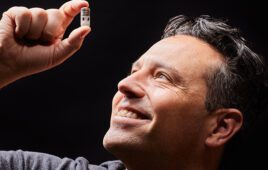
How Mayo Clinic will accelerate Endiatx’s PillBot development
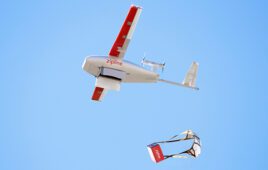
How Zipline delivers medical products by drone
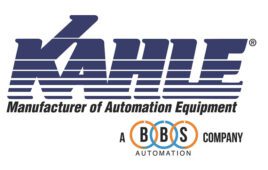
BBS Automation has a deal to buy medtech supplier Kahle Automation
Search medical design & outsourcing.
- Mergers & Acquisitions
- Cardiovascular
- Implantables
- Medical Equipment
- Supplies and Components Index
- Contract Manufacturing
- Electronics
- Motion Control
- Prototyping
- Medtech Events in 2024
- Subscribe to Print Magazine
- DeviceTalks Tuesdays
- Digital Editions
- Manufacturer Search
- Medical Device Handbook
- MedTech 100 Index
- Print Subscription
- The 2023 Big 100
- Webinars / Digital Events
- Whitepapers
- 2023 Leadership
- 2022 Leaders
- 2021 Leaders
- Women in Medtech

- Biotechnology
- Computational and Systems Biology
- Nucleic Acids
- Nutrition and Environment
- Tumor Biochemistry
- SIB Verbali Assemblee
- Events & Training
- Opportunities & Fellowships
- Patronage & Sponsor
SLAS Graduate Education Fellowship Grant

Link
Cesare Indiveri Unit of Biochemistry & Molecular Biotechnology Department DiBEST Università della Calabria Via Bucci 4c – phone +390984.492939 Arcavacata di Rende – Italy
SIB Bursaries
A limited number of bursaries to support Young SIB Members attending the Congress will be available. The call and application forms will soon be published.
Administrator_SIB

The Centre for Bl oo d Research
In pursuit of health through research in blood and blood-related processes..


SLAS Grant Advances Translation Technology for CAR-T Cell Research – Samuel Berryman
March 11, 2024

In less than a year after receiving his SLAS Graduate Education Fellowship Grant, Samuel Berryman moved from grant winner to Innovation AveNEW exhibitor. His academic research rapidly expanded into a start-up company with a marketable product – all with the support of SLAS and its network of life sciences leaders.
“The first pass through any life sciences experiment is always about learning – don’t be afraid to be messy, make mistakes or break things. It’s the second pass that’s about refining and reproducing,” says Samuel Berryman , a Ph.D. candidate in the Department of Mechanical Engineering from the University of British Columbia (UBC, Vancouver, BC, Canada), and recipient of the 2023 SLAS Graduate Education Fellowship Grant .
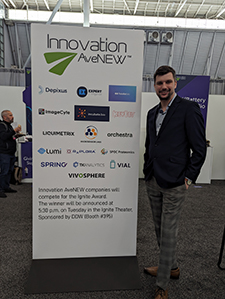
Samuel Berryman.
Berryman is a rapid-fire solution finder as he works to overcome the limitations associated with the analysis of chimeric antigen receptor T (CAR-T) cell therapies. He even wrote in his application for the SLAS grant, “I am best suited for research because I cannot just work on a small portion of a project. I need to take it apart and learn how every aspect of it fits together.” Berryman laughs and affirms that this is still the case one year into his two-year grant.
In the process of advancing his research objectives outlined in the grant proposal, Berryman invented a platform to evaluate CAR-T cells at the single-cell level, developed a process to manufacture the technology, started a business – ImageCyte – and applied to be on Innovation Ave NEW at SLAS2024 .
“We’re expanding the work in a number of different ways, but starting a company was the really big surprise from the last year!” says Berryman. “Our technology has many applications beyond what we originally envisioned. I’ve been working on new projects that potential customers would like to see, ranging from single-cell drug screening to spheroid generation and completing quick proof-of-concept demonstrations.”
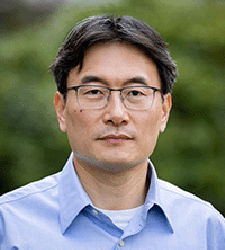
Dr. Hongshen Ma.
Sharing this vision is Berryman’s advisor, Hongshen Ma, Ph.D. , a UBC professor who is also his partner in the new business venture. “We have all these fantastic AI tools that have been used to analyze images to identify people and objects. Now we can use this approach to assess the properties of therapeutic cells,” Ma explains.
“Currently, it’s difficult to take pictures of cells and associate them with their type or function,” Ma continues. “While this information is likely available in cell images, we need a good way to associate the images with outcomes of assays. The device that Sam has built will be good for this – we can put single cells into these chambers, take high-quality images, and then assay each cell to associate the cell image with its function and behavior.” Ma adds that the resulting data can be compiled, shared and built upon by other scientists.
Berryman’s device features an array of millions of nano-well chambers that have been photolithographically fabricated inside standard glass-bottom micro-well plates. Researchers deposit single cells into individual chambers to observe cell characteristics ranging from cell phenotypes to dynamic behaviors.
In his research, Berryman is placing individual CAR-T cells and target cancer cells in the nano-wells to perform a killing assay to identify functionally superior CAR-T cells. He will acquire high-quality images of these cells to use AI approaches to identify cell morphologies indicative of highly functional CAR-T cells. This work will provide an improved assay to perform quality control of CAR-T cell function.
Eyes Wide Open
Berryman, whose academic pursuits switched from mechanical to biomedical engineering during his graduate studies, appreciates the constant opportunity to continue learning in life sciences. “You don’t just learn one thing and then do it over and over again. You have to constantly be learning and adapting. With everything you do, there is the opportunity for it to have a lasting impact in medicine, which is deeply rewarding,” he comments.
He compares this to the manufacturing process associated with his newly minted nano-well device. “It’s one thing to make a device that you use a couple of times in an academic lab, however, when you want to make devices that could be used by external users, there’s another threshold to meet in terms of quality control,” comments Berryman.
At the start of his grant, Berryman met with manufacturing companies to discuss mass producing the device by licensing the intellectual property, but it quickly became apparent that the best option was to develop a process to manufacture the device himself.
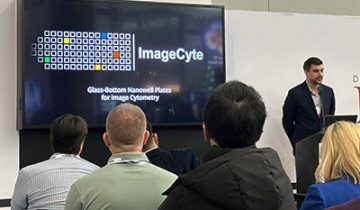
Samuel presenting at SLAS2024.
The opportunity on SLAS Innovation Ave NEW offered Berryman a chance to showcase the device and present its usefulness to a broader audience of life sciences researchers.
“Taking part in Innovation Ave NEW at SLAS2024 and giving an SLAS Ignite presentation was an incredible experience for us, especially being a company at such an early stage,” Berryman comments.
“While we had the opportunity to build brand awareness with potential customers, we found that it was even more important to make initial contact with many of the exhibiting companies. Following the conference, we are going to be translating those conversations into new manufacturing opportunities, development projects and potential distribution agreements. This was all made possible by the sponsorship we received through the Innovation Ave NEW platform. We highly recommend other life sciences start-up companies take advantage of the opportunity. It is an accelerant that will drive your company towards success.”
With A Little Help from Friends
“The SLAS Graduate Education Fellowship Grant is a great opportunity, because it gives you the platform to present your research first and foremost. It also opens the door to taking part in the SLAS community,” says Berryman. “Whether the applicant is looking for a postdoc, a job in industry or – as in my case – a commercial partner, there are so many opportunities to connect with people at SLAS.”
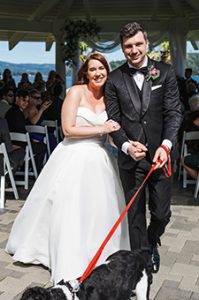
Samuel with his wife, Rachael – Photo courtesy of Jesse Holland Photography.
Berryman describes himself as fortunate that SLAS is sponsoring the journey of his technology from research to commercialization and adds that the encouragement from Ma also has been invaluable.
“He’s been extremely supportive along the way, and as we commercialize this device together, we’re shifting from me working for him to working together as a team. It’s an interesting transition,” Berryman says, adding that he continues to look for ways to pay forward the support he’s received.
“You learn a lot from the people you mentor and teach. Mentoring is a great opportunity to help solidify your own knowledge,” he comments. For the past five years, Berryman has been a teaching assistant for the mechatronic product design course at UBC. “I helped run the labs and developed some of the course design. I loved doing this. Among the 40 or so people that you teach, you develop a few different approaches to help others understand the subject matter. This gives you an opportunity to learn the material more thoroughly.”
A try- and try-again approach is one Berryman recommends to others as they pursue science. “There are so many positive learning
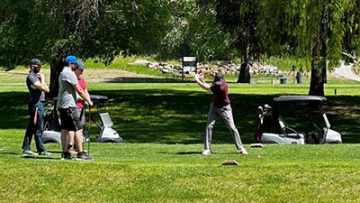
Samuel playing golf.
outcomes that develop from making small mistakes and escaping from the lab for a break,” comments the newly-wed Berryman, who enjoys spending hours out of the lab with his wife, Rachael, and the couple’s dog, Dante – and occasionally hitting the links for a few holes of golf.
“Science is not easy,” he says. “The advice I give is, don’t restrict your research or your ambition to familiar territory – that’s not how you learn. Instead, seek excellent mentors to guide you through this unknown territory and make your decisions based on the potential to expand your knowledge base. Even if you fail along the way, you gain wisdom to use toward whatever comes next.”
SLAS (Society for Laboratory Automation and Screening) is an international professional society of academic, industry and government life sciences researchers and the developers and providers of laboratory automation technology. The SLAS mission is to bring together researchers in academia, industry and government to advance life sciences discovery and technology via education, knowledge exchange and global community building.
SLAS publishes two peer-reviewed and MEDLINE-indexed scientific journals, SLAS Discovery and SLAS Technology . For more information about SLAS and its journals, visit www.slas.org/journals .
This story was originally posted on The Society for Laboratory Automation and Screening (SLAS) website.
- Menu Close
- Search
Santosh Paidi named 2018 recipient of SLAS Graduate Education Fellowship Grant
- Student Experience
Share Options
- Share toTwitter
- Share toFacebook
- Share toLinkedIn
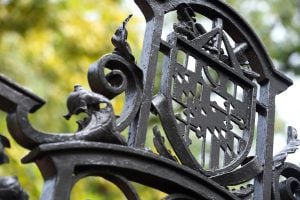
The SLAS (Society for Laboratory Automation and Screening) has selected Santosh Paidi, a graduate research assistant in the Department of Mechanical Engineering at Johns Hopkins University, as the recipient of the 2018 SLAS Graduate Education Fellowship Grant.
According to a press release from SLAS, “The $100,000 fellowship grant, awarded over two years, will allow Paidi to continue his work in the lab of Professor Ishan Barman , which employs vibrational spectroscopy and recent improvements in areas such as optics, nanotechnology and computing, to develop improved diagnostic tools that can provide rapid, robust, quantitative and molecular-specific readouts from biological specimen.”
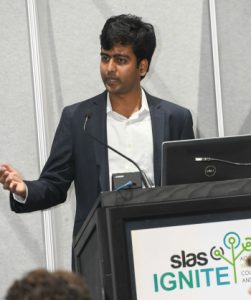
Santosh Paidi
“I am interested in working at the intersection of engineering and medicine to address major health care challenges such as cancer diagnosis and therapeutics. My current training in the multidisciplinary Ph.D. program at Johns Hopkins University is equipping me with the knowledge of several evolving fields,” Paidi told SLAS. “This award, and continued association with SLAS community, will significantly help advance my career and allow me to contribute to the stellar legacy of SLAS.”
“Santosh is a creative, energetic, young scientist who skillfully blends several cutting-edge optical approaches to investigate complex problems in oncology. The SLAS award is not only a major recognition of his accomplishments but will also propel his work into developing new tools that can address significant unmet needs in diagnosis, prognosis, therapeutic response or resistance monitoring of breast cancer,” said Professor Barman.
Prior to Johns Hopkins, Paidi graduated from Indian Institute of Technology (IIT) Bombay in 2014 with a B.Tech in Mechanical Engineering and a minor in Aerospace Engineering. As an undergraduate, his research was directed towards understanding the effects of inert gas dilution on the characteristics of hydrogen combustion. Overall, his research efforts have resulted in 9 peer-reviewed publications in journals such as Cancer Research, Analytical Chemistry, and Scientific Reports. He has been awarded the Whiting School Doctoral Fellowship and Mechanical Engineering Departmental Fellowship by Johns Hopkins University, Molecular Medicine Tri-Conference Student Fellowship and Undergraduate Research Award by IIT Bombay in recognition of his work. Most recently, Paidi won the Tomas A. Hirschfeld Award from the Federation of Analytical Chemistry and Spectroscopy Societies (FACSS).
The SLAS (Society for Laboratory Automation and Screening) is an international community of nearly 20,000 professionals and students dedicated to life sciences discovery and technology.
You can read the full press release here.
Ohio State nav bar
The Ohio State University
- BuckeyeLink
- Find People
- Search Ohio State
Area Studies Centers award $1.15 million in FLAS fellowships
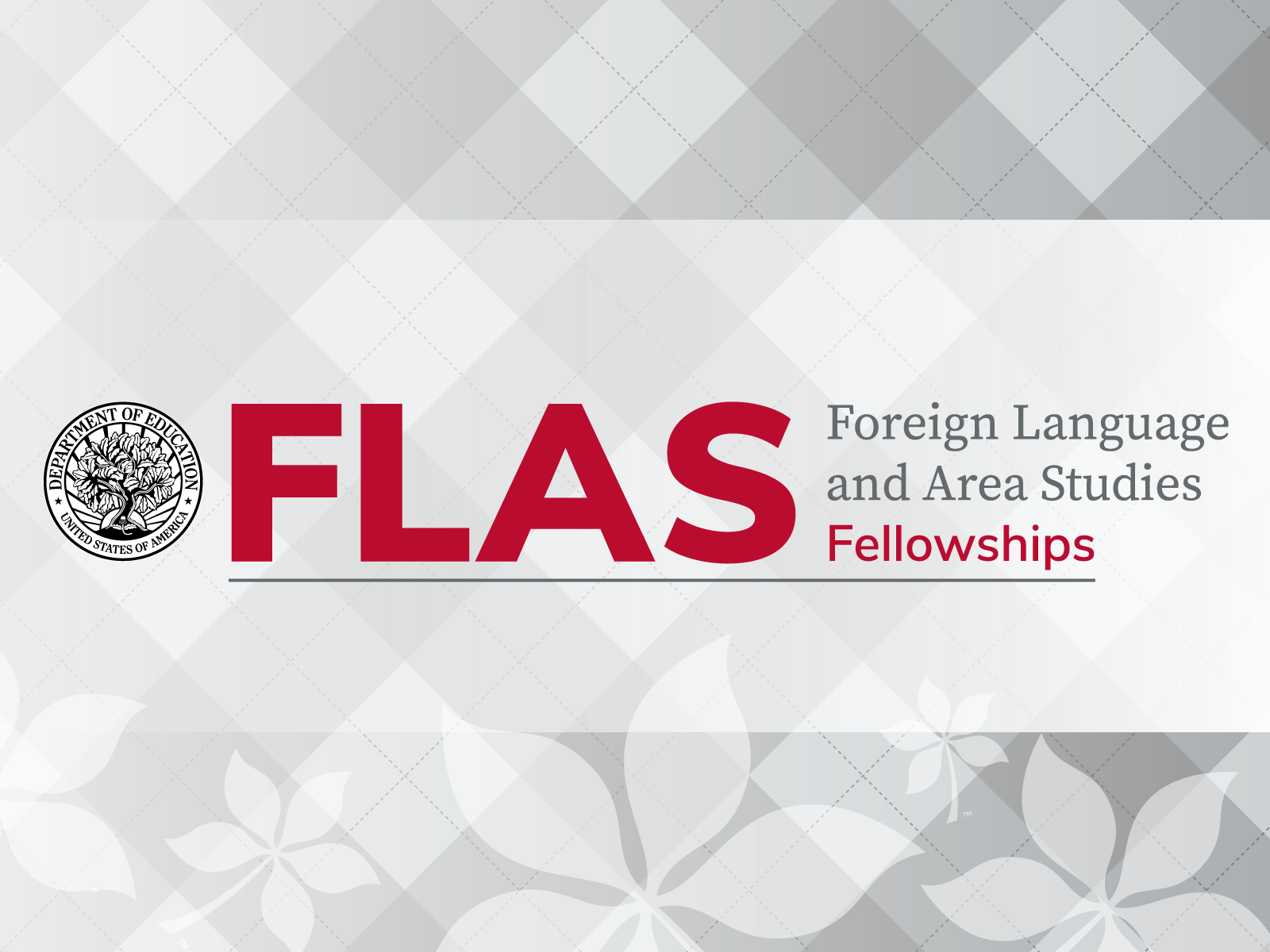
The East Asian Studies Center, Center for Latin American Studies and Center for Slavic, East European and Eurasian Studies have awarded $1.150 million in student support this year in the form of 50 Foreign Language and Area Studies (FLAS) Fellowship grants to Ohio State students spanning 16 graduate programs and 22 undergraduate majors. Funding for FLAS Fellowships comes from the U.S. Department of Education under Title VI of the Higher Education Act and is subsidized by generous matching funding from The Ohio State University Graduate School.
This year’s FLAS fellowships support the development of area studies knowledge and language fluency in 13 languages.
- The East Asian Studies Center awarded funding to two graduate and two undergraduate students in Summer 2024 and eight graduate and five undergraduate students in Academic Year 2024-2025 to support advanced studies of Chinese, Japanese and Korean.
- The Center for Latin American Studies awarded funding to two graduate and two undergraduate students in Summer 2024 and four graduate and five undergraduate students in Academic Year 2024-2025 to support the study of Haitian Creole, Portuguese and Quechua.
- The Center for Slavic, East European, and Eurasian Studies awarded funding to two graduate and five undergraduate students in Summer 2024 and nine graduate and four undergraduate students in Academic Year 2024-2025 to support the study of Bosnian-Croatian-Serbian, Bulgarian, Polish, Russian and Uzbek.
Summer FLAS Fellows complete the equivalent of a full year of language study in an intensive program (usually 6-10 weeks long). The fellowship covers up to $5,000 of the language program’s tuition, provides a $2,500 stipend, and in some instances, up to $1,000 towards travel.
Academic year FLAS Fellowships are awarded to undergraduate, graduate or professional students who are enrolled in a course of study at Ohio State that requires both language and area studies expertise. Students are required to take one language and one area studies course in both autumn and spring semesters, completing one academic year language sequence. The fellowship provides a stipend of $20,000 and tuition support up to $18,000 for graduate and professional students, though Graduate School contributions cover all tuition costs for most fellows. For undergraduate students, it provides a stipend of $5,000 and tuition and fees up to $10,000.
View a complete list of FLAS recipients .
Date: 5/7/2024 12:00:00 AM
Unit: System.String[]
- Top Stories More News
- Today's National Outlook
- Hurricane Tracker
- Snow & Ski Forecast
- Cold & Flu
- Allergy Forecast
- Fire Updates
- Traffic Cameras
- Weather Cameras
- Outdoor Sports Guide
635th Anti-Aircraft Missile Regiment
635-й зенитно-ракетный полк
Military Unit: 86646
Activated 1953 in Stepanshchino, Moscow Oblast - initially as the 1945th Anti-Aircraft Artillery Regiment for Special Use and from 1955 as the 635th Anti-Aircraft Missile Regiment for Special Use.
1953 to 1984 equipped with 60 S-25 (SA-1) launchers:
- Launch area: 55 15 43N, 38 32 13E (US designation: Moscow SAM site E14-1)
- Support area: 55 16 50N, 38 32 28E
- Guidance area: 55 16 31N, 38 30 38E
1984 converted to the S-300PT (SA-10) with three independent battalions:
- 1st independent Anti-Aircraft Missile Battalion (Bessonovo, Moscow Oblast) - 55 09 34N, 38 22 26E
- 2nd independent Anti-Aircraft Missile Battalion and HQ (Stepanshchino, Moscow Oblast) - 55 15 31N, 38 32 23E
- 3rd independent Anti-Aircraft Missile Battalion (Shcherbovo, Moscow Oblast) - 55 22 32N, 38 43 33E
Disbanded 1.5.98.
Subordination:
- 1st Special Air Defence Corps , 1953 - 1.6.88
- 86th Air Defence Division , 1.6.88 - 1.10.94
- 86th Air Defence Brigade , 1.10.94 - 1.10.95
- 86th Air Defence Division , 1.10.95 - 1.5.98

- Bahasa Indonesia
- Eastern Europe
- Moscow Oblast
Elektrostal
Elektrostal Localisation : Country Russia , Oblast Moscow Oblast . Available Information : Geographical coordinates , Population, Area, Altitude, Weather and Hotel . Nearby cities and villages : Noginsk , Pavlovsky Posad and Staraya Kupavna .
Information
Find all the information of Elektrostal or click on the section of your choice in the left menu.
- Update data
Elektrostal Demography
Information on the people and the population of Elektrostal.
Elektrostal Geography
Geographic Information regarding City of Elektrostal .
Elektrostal Distance
Distance (in kilometers) between Elektrostal and the biggest cities of Russia.
Elektrostal Map
Locate simply the city of Elektrostal through the card, map and satellite image of the city.
Elektrostal Nearby cities and villages
Elektrostal weather.
Weather forecast for the next coming days and current time of Elektrostal.
Elektrostal Sunrise and sunset
Find below the times of sunrise and sunset calculated 7 days to Elektrostal.
Elektrostal Hotel
Our team has selected for you a list of hotel in Elektrostal classified by value for money. Book your hotel room at the best price.
Elektrostal Nearby
Below is a list of activities and point of interest in Elektrostal and its surroundings.
Elektrostal Page

- Information /Russian-Federation--Moscow-Oblast--Elektrostal#info
- Demography /Russian-Federation--Moscow-Oblast--Elektrostal#demo
- Geography /Russian-Federation--Moscow-Oblast--Elektrostal#geo
- Distance /Russian-Federation--Moscow-Oblast--Elektrostal#dist1
- Map /Russian-Federation--Moscow-Oblast--Elektrostal#map
- Nearby cities and villages /Russian-Federation--Moscow-Oblast--Elektrostal#dist2
- Weather /Russian-Federation--Moscow-Oblast--Elektrostal#weather
- Sunrise and sunset /Russian-Federation--Moscow-Oblast--Elektrostal#sun
- Hotel /Russian-Federation--Moscow-Oblast--Elektrostal#hotel
- Nearby /Russian-Federation--Moscow-Oblast--Elektrostal#around
- Page /Russian-Federation--Moscow-Oblast--Elektrostal#page
- Terms of Use
- Copyright © 2024 DB-City - All rights reserved
- Change Ad Consent Do not sell my data

IMAGES
VIDEO
COMMENTS
SLAS will award one grant (up to $50,000) per year, for a maximum of two years, to qualified educational institutions on behalf of deserving students enrolled in a graduate program at that institution. Applications for 2023 are now closed. SLAS Graduate Education Fellowship Grant Timeline. June 23, 2023: Applications Open
David McIntyre. Oak Brook, IL - The Society for Laboratory Automation and Screening (SLAS) is pleased to announce David McIntyre, Ph.D. candidate from Boston University (Boston, MA, USA), as the 2021 SLAS Graduate Education Fellowship Grant recipient. SLAS will award $50,000 per year for two years to Boston University to support McIntyre who will expand his research on accelerating the ...
Oak Brook, IL (May 5, 2022) - The Society for Laboratory Automation and Screening (SLAS) is pleased to announce Benjamin David, a Ph.D. candidate from the University of Michigan, Ann Arbor (Ann Arbor, MI, USA), as the 2022 SLAS Graduate Education Fellowship Grant recipient. "I am excited about this opportunity," David comments. "The SLAS grant offers the freedom to explore interesting ...
Oak Brook, IL (March 15, 2023) - The Society for Laboratory Automation and Screening (SLAS) is pleased to announce Samuel G. Berryman, Ph.D. candidate in the Department of Mechanical Engineering from the University of British Columbia (Vancouver, BC, Canada), as the 2023 SLAS Graduate Education Fellowship Grant recipient. "I feel extremely grateful and enthusiastic to have been chosen as ...
Judging criteria for the SLAS Graduate Education Fellowship Grant is based on the applicability of the student researcher's work to laboratory automation and screening, originality and ...
The SLAS Grant Program was introduced in 2015 to facilitate educational opportunities for outstanding students pursuing graduate degrees related to quantitative biosciences and/or life sciences R&D.
The Society for Laboratory Automation and Screening (SLAS) is pleased to announce David McIntyre, Ph.D. candidate from Boston University (Boston, MA, USA), as the 2021 SLAS Graduate Education ...
The Society for Laboratory Automation and Screening (SLAS) is pleased to announce David McIntyre, Ph.D. candidate from Boston University (Boston, MA, USA), as
SLAS will award one grant (up to $50,000) per year, for a maximum of two years, to qualified educational institutions on behalf of deserving students enrolled in a graduate program at that institution. Program eligibility is limited to educational organizations and academic institutions that offer graduate degree programs related to ...
The application period for the 2021 SLAS Graduate Education Fellowship Grant runs from August through December 2020. * * * * SLAS (Society for Laboratory Automation and Screening) is an ...
We welcome the 2023 SLAS Graduate Education Fellowship Grant recipient Samuel G. Berryman, Ph.D. candidate in the Department of Mechanical Engineering from the University of British Columbia (Vancouver, BC, Canada), as our guest. The SLAS grant will support Berryman's research in developing and des…
The Society for Laboratory Automation and Screening (SLAS) is currently accepting applications to be considered for the Society's new Graduate Education Fellowship Grant Program, which supports graduate students looking to pursue a career in the life sciences.
June 23, 2023: Applications Open
In less than a year after receiving his SLAS Graduate Education Fellowship Grant, Samuel Berryman moved from grant winner to Innovation AveNEW exhibitor. His academic research rapidly expanded into a start-up company with a marketable product - all with the support of SLAS and its network of life sciences leaders.
Info for Graduate Students. Info for Postdocs. Info for Faculty. Info for Staff. Info for Visiting Scholars. Department of Mechanical Engineering. Department of Mechanical Engineering Utility Navigation.
The fellowship provides a stipend of $20,000 and tuition support up to $18,000 for graduate and professional students, though Graduate School contributions cover all tuition costs for most fellows. For undergraduate students, it provides a stipend of $5,000 and tuition and fees up to $10,000. View a complete list of FLAS recipients.
Outdoor Sports Guide. Plan you week with the help of our 10-day weather forecasts and weekend weather predictions for Moscow, Moskovskaya oblast', RU.
Main page; Contents; Current events; Random article; About Wikipedia; Contact us; Donate; Pages for logged out editors learn more
635th Anti-Aircraft Missile Regiment. 635-й зенитно-ракетный полк. Military Unit: 86646. Activated 1953 in Stepanshchino, Moscow Oblast - initially as the 1945th Anti-Aircraft Artillery Regiment for Special Use and from 1955 as the 635th Anti-Aircraft Missile Regiment for Special Use. 1953 to 1984 equipped with 60 S-25 (SA-1 ...
Elektrostal Geography. Geographic Information regarding City of Elektrostal. Elektrostal Geographical coordinates. Latitude: 55.8, Longitude: 38.45. 55° 48′ 0″ North, 38° 27′ 0″ East. Elektrostal Area. 4,951 hectares. 49.51 km² (19.12 sq mi) Elektrostal Altitude.